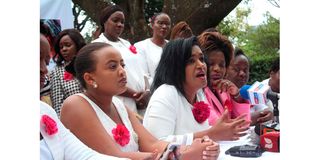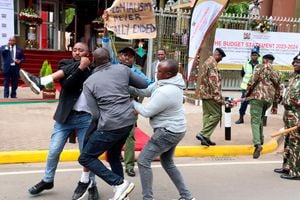Violence: The greatest obstacle for female political aspirants

Nairobi Woman Representative Esther Passaris (centre) with other leaders during a 2019 press conference where female politicians and activists condemned gender-based violence facing women in the country.
What you need to know:
- Women and other marginalised groups should be assured of a balanced political field free from any form of discrimination in the next election.
- To address lack of campaign money, the Cowa proposes that political parties reduce nomination fees and associated campaign costs for female aspirants.
If current efforts by civil organisations working around women’s empowerment in the electoral process is anything to go by, Kenya may just realise the anticipated huge numbers of elected women in the country’s history in next year’s election.
The determination to have more women participate in the election as aspirants, political parties’ decision makers and as voters, is discernible in the many trainings targeting them.
This success will, however, only be realised if stakeholders including government, related bodies such as the Independent Electoral and Boundaries Commission (IEBC) and security agencies, exhibit the will to do as the law requires, in the 2022 General Election. It is important that women and other marginalised groups are assured of a balanced political field free from any form of discrimination.
Some obstacles to women’s effective participation in elections that should be addressed before 2022, were identified at a recent meeting hosted by the Common Women Agenda (Cowa) in Nairobi. The forum made a decision to take another stab at the elusive constitutional two-thirds gender rule.
But rather than reach out to a reluctant Parliament where the political will to implement it lacks, the women agreed to follow structured strategies. The forum of more than 200 women from different sectors, resolved to work together to achieve that objective, their political affiliation notwithstanding.
Forthcoming election
Consequently, they set a target of 5,000 female candidates at the minimum, in the forthcoming election. But even as women leaders plan how to increase their numbers in 2022, the route to attain this will be to have droves of women offer themselves as candidates.
To address lack of campaign money, the Cowa proposes that political parties reduce nomination fees and associated campaign costs for female aspirants. The participants also recommended legal options that would provide an assurance for the two-thirds gender requirement in next year’s election.
Among the urgent mechanisms they agreed on is the need to ensure party nomination lists are two-thirds gender compliant, within this month, as part of election preparedness. In addition, they want women to be allowed to vie in party strongholds. Participants also proposed that a special fund, run by the Registrar of Political Parties, be created to support women who will run for governorship and parliamentary seats. This too, will need political goodwill.
But of all the obstacles female political aspirants face, violence stands out. It includes physical attacks, their teams, their family, verbal insults, intimidation and other related harassment. The fear of such attacks keeps many women off the political space. Despite assurances of security to women every election season, the abhorrent practice never seems to end.
BBI
Unfortunately, the violence extends to the campaigns for the exclusive Woman Representative seat, mostly perpetrated by men in support of their preferred female candidate. One of the gains for women in the failed Building Bridges Initiative (BBI) was protection against election violence.
The BBI had proposed enhanced punishment for perpetrators of political violence against women. It is, however, not late to make legislative amendments to make it safe for women to participate in the election. It does not have to take the BBI for women to exercise this right without looking over their shoulders. In this regard, the Cowa has asked that in addition to protection of the female candidates, women should be included in peace and security structures for the next election.
There is hope, however, if the government makes good its promise to give special attention to women aspirants and candidates, in particular, by according them protection against any form of violence. Cabinet Secretary for Interior and Coordination of National Government Dr Fred Matiang’i, last month, gave an undertaking to protect women against abusive campaigns. He instructed county commissioners and administrators to make the safety and security of female aspirants a priority. Notably, he instructed the provincial administrators to not only create a data base for female aspirants and map out their security needs, but also be intentional in meeting their security needs.
Vulnerable population
In his statement to that effect, the CS rightly observed: “The maturity of our democracy will be detested on the level of participation of every voter and aspirant in the elections, including women and the vulnerable population.” This assurance is not only welcome, but also comes at a time the world is marking the 16 Days of Activism against gender-based violence.
It is a statement that gives an assurance to the woman torn between throwing her bid into the political arena and keeping away out of fear of being attacked while at it.
The nation will be watching for the implementation.
Ms Rugene, a former Parliamentary Editor at the Nation, is founder, The Woman’s Newsroom Foundation. Email: [email protected] Twitter: @nrugene





